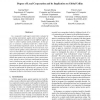Free Online Productivity Tools
i2Speak
i2Symbol
i2OCR
iTex2Img
iWeb2Print
iWeb2Shot
i2Type
iPdf2Split
iPdf2Merge
i2Bopomofo
i2Arabic
i2Style
i2Image
i2PDF
iLatex2Rtf
Sci2ools
ATAL
2004
Springer
2004
Springer
Degree of Local Cooperation and Its Implication on Global Utility
In a cooperative multi-agent system that is situated in an evolving environment, agents need to dynamically adjust their negotiation attitudes towards different agents in order to achieve optimal system performance. In this paper, we construct a statistical model for a small cooperative multi-linked negotiation system. It presents the relationship between the environment, the level of local cooperation and the global system performance in a formal and clear way that allows us to explain system behavior and predict system performance. The analysis results in a set of design equations that can be used to develop distributed mechanisms that optimize the performance of the system dynamically. It helps us more concretely understand the important issue of distraction and provides us with the local attitude parameter to handle distraction effectively. This research demonstrates that sophisticated probabilistic modelling can be used to understand the behaviors of a system with complex agent i...
ATAL 2004 | Cooperative Multi-linked Negotiation | Negotiation Attitudes | Sophisticated Probabilistic Modelling |
Related Content
| Added | 30 Jun 2010 |
| Updated | 30 Jun 2010 |
| Type | Conference |
| Year | 2004 |
| Where | ATAL |
| Authors | Jiaying Shen, Xiaoqin Zhang, Victor R. Lesser |
Comments (0)

